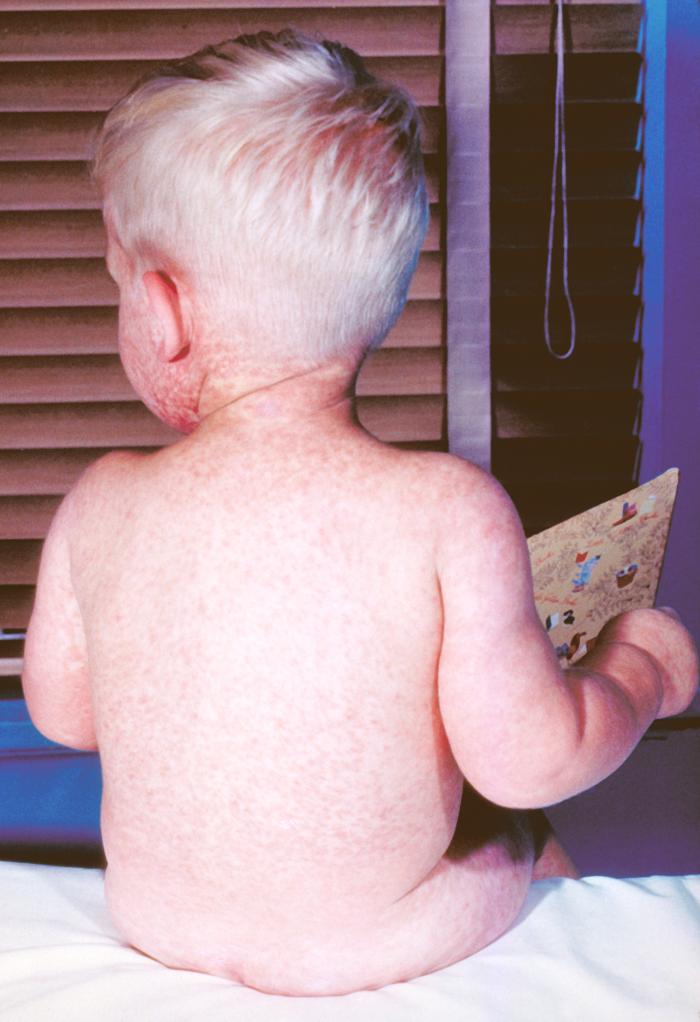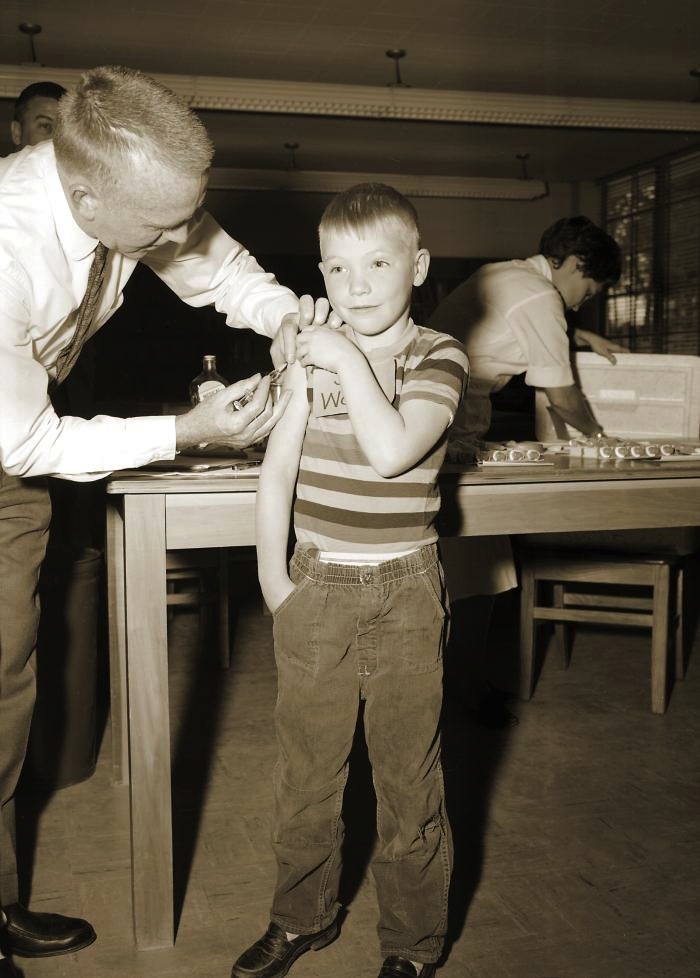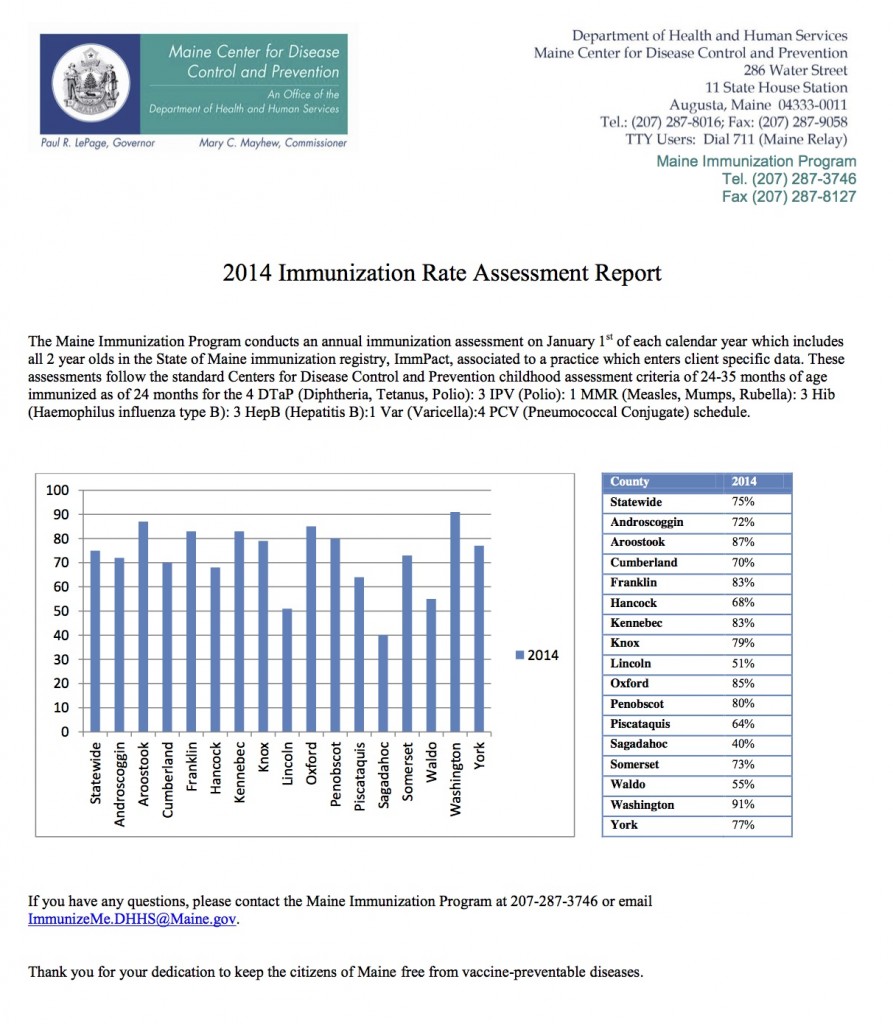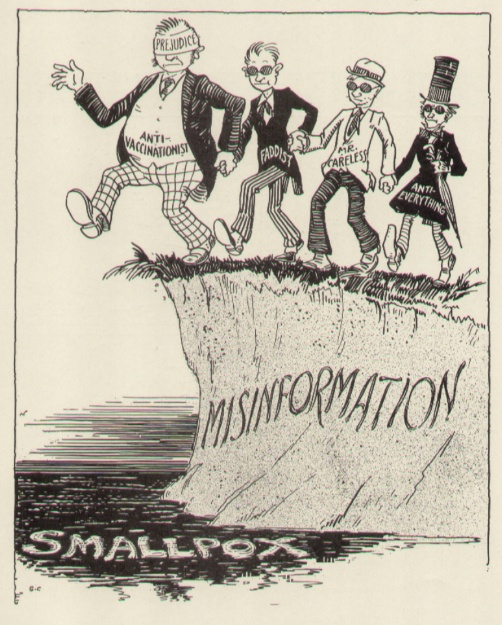The last major outbreak of measles in the United States was 1989 – 1991. Dr. Dora Anne Mills, former head of the Maine CDC, remembers it well.
During the outbreak, Dr. Mills was a practicing pediatrician in California. She treated children with measles and she saw some of them die — children who had weakened immune systems because they were already battling other diseases, such as cancer. She also saw extreme measles cases while working in East Africa in the mid to late 80s.
Dr. Mills says the last outbreak in this country was mainly due to two things:
- Children were getting one dose of the measles vaccine at that time, which offered only about 93% immunity.
- A large number of children were uninsured and didn’t get vaccinated.
The outbreak led to two major changes:
- Instead of getting a single dose of the MMR vaccine (measles, mumps, rubella), in 1990 a second dose was added to the childhood vaccination schedule. First dose at 12-15 months and a second dose between four and six years.
- Healthcare coverage was expanded for children and the government began purchasing vaccines at a low cost and distributing to states to give to uninsured and underinsured children, as well as those on Medicaid.
No more measles, until …
In 2000, the CDC declared that measles in the United States had essentially been wiped out. Any reported cases did not originate in the U.S. but came from other countries.
Four years later, 37 cases were reported and in 2014, 644 cases from 23 separate outbreaks in 27 states. (The last confirmed case in Maine was in 1997.)
By the end of the first month of 2015, 102 cases had already been reported in 14 states — Arizona, California, Colorado, Illinois, Minnesota, Michigan, Nebraska, New York, Oregon, Pennsylvania, South Dakota, Texas, Utah and Washington. Most were linked to an exposure either at Disneyland or Disney California Adventure Park in Anaheim, California.
We’re seeing more measles because more parents are choosing not to get their children vaccinated say health officials, including Dr. Mills. “We thought we fixed the issue by making sure there was more vaccine available in two doses,” she says, “and now we’re facing a big measles outbreak — apparently because many people have chosen not to have children vaccinated. I’m not shocked because I know we’ve had increasing numbers of parents who’ve chosen not to vaccinate, but it’s also just stunning that we have so many children and young adults who are getting
Vaccination rates
The nation’s overall vaccination rate is still considered high — about 95 percent by kindergarten age. But the rates aren’t consistent across the country. Take Maine, for example.
In 2014, Maine’s overall vaccination rate was 75%. Washington County’s was the highest at 91% and Sagadahoc County’s the lowest at 40%.
Why fewer vaccinations?
Countless studies have shown that, traditionally, the key person people turn to for health information is their doctor. It’s not friends or health reporters or bloggers or celebrities or television or the Internet — and yet, when it comes to the issue of childhood vaccinations, that is precisely where some people are getting their information these days.
“With the growth of the Internet,” says Dr. Mills, “people have a lot more access to information and misinformation, and that misinformation can travel at lightning speed or even faster.”
Many health professionals are frustrated, including Brunswick pediatrician Dr. Larry Losey. Dr. Losey has seen his fair share of “vaccine hesitant parents” and says that persuading them to consider the scientific evidence is often difficult.
“It’s really tough to say this and not come off as arrogant,” he says, “but they tend to think they know as much. That [their] knowledge and [their] opinion is as good as anybody’s. I really want to try to keep from being arrogant, but I do have a little bit of training, experience and background in this area.”
A number of factors seem to be driving some people’s reluctance to vaccinate their children — mistrust of authority, the government, drug companies, the medical establishment and even science.
Attitudes that have existed for generations.
This cartoon has been making the rounds on the Internet. On the website I.T.C.H, it says the image was “extracted from the 1930s cartoon booklet Health in Pictures.”
There was an anti-vaccination movement back then, too. The disease was smallpox.
As in 1930, there are people today who are also afraid of possible vaccine reactions. In 1998, former British surgeon Andrew Wakefield claimed in a paper published in the medical journal The Lancet, that the MMR vaccine might cause autism. He did a small study — just 12 people — but it caused a huge stir and terrified parents decided that autism was way scarier than measles. Wakefield was later discredited and lost his medical practice, and The Lancet retracted the paper. Since then, several studies have found nothing that links the MMR vaccine to autism, but some individuals continue to believe Wakefield’s claims and refuse to get their kids vaccinated.
Some parents are generally concerned about vaccine safety. Others believe multiple vaccines overload children’s immune systems and that “natural immunity” is more effective. And still others question the need to immunize healthy people in the first place.
A small percentage of people can’t be vaccinated because of medical issues; others are against it for religious reasons. And then, there are people who simply don’t like being told what to do.
Benjamin Franklin
Benjamin Franklin learned the hard way that when it comes to being vaccinated against certain diseases, it can make far more sense to do it than not. His son died because he decided not to get him vaccinated against smallpox.
“In 1736 I lost one of my sons, a fine boy of four years old, by the small-pox, taken in the common way. I long regretted bitterly, and still regret that I had not given it to him by inoculation. This I mention for the sake of the parents who omit that operation, on the supposition that they should never forgive themselves if a child died under it; my example showing that the regret may be the same either way, and that, therefore, the safer should be chosen.”
Of course, Franklin’s experience is just a personal account, not science.
The science of measles
The science of measles is that it is highly contagious. “It is incredibly contagious,” explains Dr. Losey. “If you walk into a room where someone with measles has been within the last two hours, and you’re susceptible, there’s a 90 percent chance of you getting it. Turning it around, each person with measles can transmit it on average to 12 to 14 other people. The Ebola virus that everybody was worried about last year is spread to only one or two people and only by direct contact. Measles is [airborne] and it can linger in the air and hard surfaces for a couple of hours. You don’t even have to be in the same room with someone.”
Most people born before 1957 are probably immune. Before there was a vaccine in the early 60s, nearly everyone in the United States came down with measles before the age of 15.
Nowadays, many people have no frame of reference for measles. They think of it as a disease of the past and some argue that it isn’t such a big deal. For most people, it isn’t, but the complications can be serious, even deadly.
“Back in the 1950s,” says Dr. Losey, “when we were having half a million cases a year, there were roughly 500 deaths a year from measles — one to three out of a thousand.”
Measles symptoms
Symptoms can begin from seven to 21 days after a person is exposed.
- High fever
- Cough
- Runny nose
- Red watery eyes
- Tiny white spots inside mouth
- Rash from head to toe
Measles complications
- Ear infection that can cause permanent hearing loss
- Diarrhea
- Pneumonia
- Encephalitis
Roald Dahl
In 1962, the oldest daughter of author Roald Dahl and his wife, actress Patricia Neal, died of measles. She was 7 years old. Her name was Olivia. Twenty-six years later, Dahl wrote a letter explaining what happened.
“MEASLES: A dangerous illness.
Olivia, my eldest daughter, caught measles when she was seven years old. As the illness took its usual course I can remember reading to her often in bed and not feeling particularly alarmed about it. Then one morning, when she was well on the road to recovery, I was sitting on her bed showing her how to fashion little animals out of coloured pipe-cleaners, and when it came to her turn to make one herself, I noticed that her fingers and her mind were not working together and she couldn’t do anything.
‘Are you feeling all right?’ I asked her.
‘I feel all sleepy,’ she said.
In an hour, she was unconscious. In twelve hours she was dead.”
The virus had spread to Olivia’s brain and caused encephalitis. You can read the rest of the letter on the Roald Dahl website.
The risk of refusing
Refusing to vaccinate your children against measles (and other contagious diseases) doesn’t just put them at risk. It also puts other people at risk, especially, says Dr. Mills, someone who may already be sick. “Children with leukemia, for instance,” she says. “They are now [surviving]. It is very curable, but they are very susceptible to infections. There are a lot of people with suppressed immune systems. Adults and children.”
As Dr. Losey explained, measles is so contagious that 90 percent of the people who are not immune will become infected if they’re exposed to someone carrying the disease. Unvaccinated people can become infected if they travel to other parts of the world where measles in still common. Travelers with measles can also bring the disease into the United States and, says the CDC, measles can spread (as it has been doing the past several weeks) when it reaches a community in the U.S. where groups of people are unvaccinated.
Proposed legislation
In Maine, the current state vaccination law allows people to opt out of vaccinations for philosophical reasons. The state has the fourth highest vaccination opt-out rate in the country. A couple of bills have been submitted to the legislature that would amend the philosophical exemption. In essence, they would require parents and a medical professional to sign a statement indicating that the parent has been informed of the risks and benefits of vaccination.
In response, the Maine Coalition for Vaccine Choice has also proposed legislation that it says “will address the true problems in the vaccine program that are destroying trust in vaccination and driving a wedge between families and their physicians.”
What is your opinion?
Are you in favor of vaccinations or against them? Which do you think poses the greater risk or offers the greater benefit? Vaccinating or not vaccinating? Why? Share your opinion in the comment box below.
Catching Health message
In case you didn’t know, I send out a monthly Catching Health Newsletter that highlights recent posts you might have missed. It’s an easy way to stay in touch. I hope you’ll sign up!





Leave A Comment